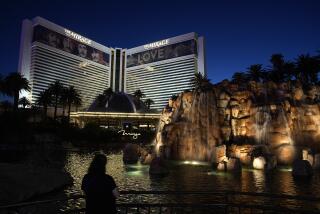UPDATE : New Orleans Awaits Payoff From Struggling New Casinos
- Share via
NEW ORLEANS — At least three times a week, Melvina Epps clutches her purse on the bus ride from the New Orleans neighborhood of Gentilly to Harrah’s Casino, the city’s first land-based gambling hall, where she spends anywhere from $50 to $100.
“I love this place,” said the homemaker, who is in her late 50s, after a particularly unlucky night on the quarter slot machines. “I really just can’t stay away.”
Epps should be seen as the symbol of success for the newly ascendant gaming industry here. But she could increasingly be seen as a symbol of the problem confronting Harrah’s, now operating in temporary quarters in the old Municipal Auditorium, and other casinos: The locals are coming, but where are the visitors?
“There just aren’t enough visitors coming to New Orleans from other places to gamble right now, and it is beginning to show,” said Steve Rittvo, a local gaming consultant. “It is having dire consequences for the entire industry. The numbers have been very bad.”
*
So bad, in fact, that during its first two months of operations, Harrah’s took in just over a third of its expected monthly revenues of $33 million, earning only $11.3 million in May and $13.2 million in June. And some gaming officials here think the casino’s returns are unlikely to improve for the rest of the summer, the traditional off-season in humid New Orleans.
The fortunes of riverboat gaming have been even worse. The New Orleans-based Flamingo, for example, earned an average of more than $17.5 million during the first three months of this year, only to see that revenue drop to $6.4 million in April and a disastrous $3.9 million in May. Two other boats closed in June.
“I think we can all say that so far, gambling has been a disaster for New Orleans,” said C.B. Forgotson, a New Orleans attorney and critic of the state’s jump into the gambling business.
In 1992, lawmakers permitted the construction of what has been billed as the world’s largest casino--Harrah’s--scheduled to open next summer on a busy downtown corner near the river with 200,000 square feet of gaming space. A state lottery and video poker also were given the green light. And in 1993, five riverboats opened here in competition with a string of gambling boats that had been built on the Gulf Coast, just two hours away.
“You now have a situation where the local gambling dollar can’t be stretched any more than it already is because of all of these gambling options,” Forgotson said.
But casino proponents, including outgoing Gov. Edwin W. Edwards, note that the going wasn’t smooth for Atlantic City in the late 1970s or the Mississippi Gulf Coast more than a decade later.
*
Rittvo contends that gambling “could very easily all work out in the long run, as long as it is marketed correctly, which is something that up until now hasn’t been done.”
Bally Entertainment Corp. hopes it can prove Rittvo right. This month it is opening the riverboat Belle of Orleans on Lake Pontchartrain, north of the city. “We’ve done precise market research,” said Mike Vautrian, Bally’s vice president for marketing. “We know which neighborhoods have a propensity for slot machine customers and which neighborhoods would be table game customers.”
Bally’s plans to run a shuttle service daily from its casino to several small suburban cities on the other side of Lake Pontchartrain, rounding up potential gamblers.
Casino analysts think such innovations might save the New Orleans casinos as well. They note that now those casinos are relying upon two unlikely customer bases: the more than 9 million people who attend educational and professional conventions here every year, many of whom have expressed little interest in gambling in surveys, and residents in a town with vast poverty and underemployment.
“Admittedly, we have our work cut out for us,” said Ron Lenczycki, Harrah’s New Orleans president. “But our own surveys show that once we get the people in here the first time, more than 90% tell us they will come back.”
More to Read
Sign up for Essential California
The most important California stories and recommendations in your inbox every morning.
You may occasionally receive promotional content from the Los Angeles Times.













